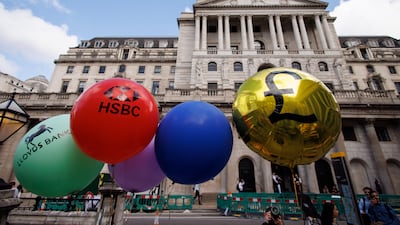Bank of England rate setters increased the interest rate for the first time in three years in December 2021, raising it from 0.1 per cent to 0.25 per cent, despite concerns over the Omicron coronavirus variant.
Markets now view that decision as a milestone on a path that is expected to see rates peak at 6 per cent by the spring of 2024.
In February 2022, the Bank raised interest rates again to 0.5 per cent in an effort to counter escalating inflation. This sparked internal controversy, with four Monetary Policy Committee members advocating for a larger increase to 0.75 per cent.
By March 2022, the war in Ukraine had escalated, pressuring the Bank to push the rate to 0.75 per cent, reverting to the pre-pandemic level. This was the first time in more than two decades that it had raised rates at three consecutive meetings.
The inflation fight led the Bank to increase interest rates to 1 per cent in May 2022, despite warnings of a potential recession. Inflation was poised to rise above 10 per cent for the first time since 1982 due, in part, to the continuing conflict in Ukraine.
By June 2022, the Bank had raised the interest rate for the fifth consecutive time to 1.25 per cent amid soaring household energy bills.
In August 2022, it implemented the largest increase in 27 years, from 1.25 per cent to 1.75 per cent. This aggressive move was aimed at tackling surging inflation.
The following month, the base rate rose to 2.25 per cent – its highest since the 2008 financial crisis, as the UK officially entered a recession.
In November 2022, the Bank further raised the rate to 3 per cent – the largest single increase in more than 30 years, warning of a possible prolonged recession and rising unemployment.
In December 2022, the rate hit 3.5 per cent, in the ninth consecutive rise since December 2021. The move led to a three-way division within the Monetary Policy Committee, causing market uncertainty.
In February 2023, the rate was lifted to 4 per cent, impacting mortgage borrowers and businesses with loans. The Bank projected that inflation might have peaked.
However, a month later it raised the interest rate again, to 4.25 per cent, due to an unexpected inflation surge. Despite this, the Monetary Policy Committee predicted modest economic growth.
In May 2023, the rate rose to 4.5 per cent, marking the 12th consecutive increase, as the Bank sought to address persistent double-digit inflation. It anticipated that inflation would fall slower than previously hoped due to persistent increases in food prices.
June's increase pushed the interest rate up by 0.5 percentage points to 5 per cent, the highest level in 15 years, leaving many homeowners once again facing higher mortgage repayments.
Just over a month later another increase brought rates up to 5.25 per cent.


